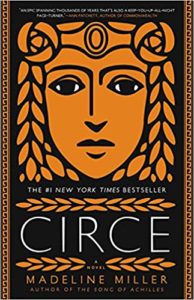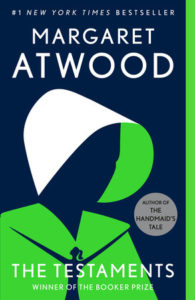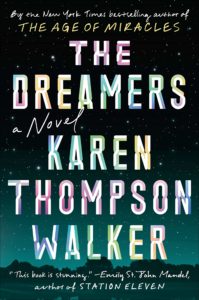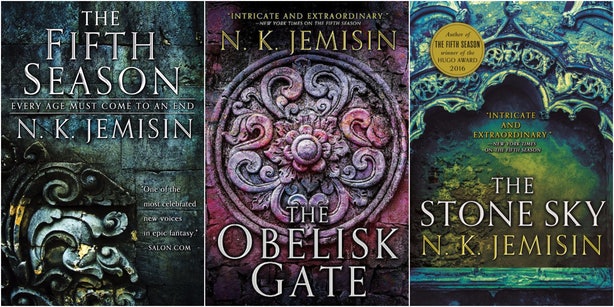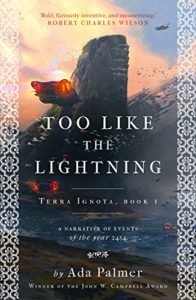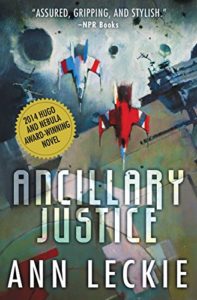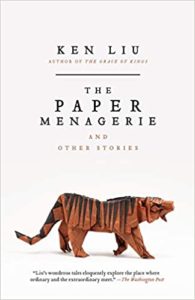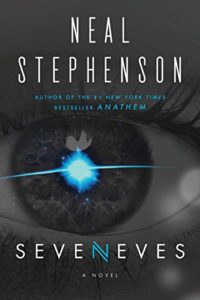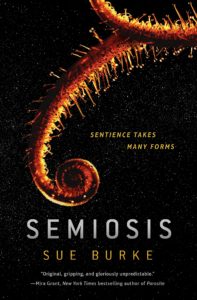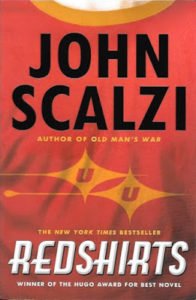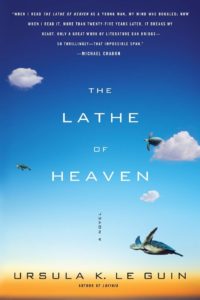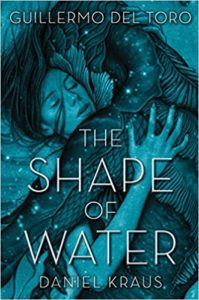Favorite Speculative Fiction of 2019
What better way to wrap up 2019 than to review some of the speculative fiction/ sci-fi/ fantasy books I read this year? I’d recommend any of these as a gift.
Circe by Madeline Miller
Recommended for: Everyone, especially feminists.
The writing is this book is gor-ge-ous. Since you’ve probably already heard about the premise (a subversive retelling of the story of a goddess best known for turning men into pigs in the classic The Odyssey), I’ll just quote you some of my favorite lines.
On her selfish father, the god Helios:
“But he was a harp with only one string, and the note it played was himself.”
On life:
“It’s not fair,” I said. “It cannot be.”
“Those are two different things,” my grandmother said.
On men’s view of women, particularly Circe as depicted in the Odyssey: “Humbling women seems to me a chief pastime of poets. As if there can be no story unless we crawl and weep.”
The Testaments by Margaret Atwood
Recommended for: Anyone who loved The Handmaid’s Tale
When I heard one of my favorite authors was writing the sequel to one of my favorite books, I didn’t know whether to be excited or horrified. I feel like our culture (particularly Hollywood) has sequel/reboot fever, and these extra installments often don’t deliver the goods. But Atwood does.
My favorite thing about the novel is that it largely centers on the character of Aunt Lydia, who I’ve always wished I understood better. Despite the horrors of Gilead, the story has a much more hopeful vein that runs through it, as its details the downfall of the corrupt authoritarian regime, which topples by rotting from the inside out.
With everything going on in the world right now, I think that’s a message a lot of us are happy to hear.
The Dreamers by Karen Thompson Walker
Recommended for: People who want a little mystery and a dash of mysticism with their science fiction
This is a book about a mysterious illness that spreads through a college town causing its victims to fall into a seemingly endless state of dreaming. The book was marketed as straight science fiction, but I think its themes about the subconscious and multiple realities make it more speculative. So does it’s ending, which does not tie everything up with a bow.
What stood out to me the most about this novel were the voices of the characters, which were incredibly realistic and nuanced. Particularly, the dialogue amongst the college students was so spot-on, I found myself wondering if Thompson sat herself down on a university campus and took notes.
The Broken Earth Trilogy by N.K. Jemisin
Recommended for: Fantasy fans who are ready to be drop-kicked out of the familiar comforts of Middle Earth
Just as the Lord of the Rings is about the horror of war, and Game of Thrones is about the “wheel” of monarchy, the Broken Earth trilogy is about oppression — on a scale that is both breathtakingly epic and painfully intimate. The trilogy has all the trappings of an incredibly original work of fantasy: magic that moves mountains, mysterious flying obelisks, creepy stone-eater monsters, world-ending earthquakes. But what makes it gut-punch-relevant is the small-scale story, which is all too realistic – that of a mother who discovers her son has been killed by his own father. She then sets out to save her daughter before the girl meets the same fate.
This is the kind of fantasy that makes me want to be an author. That reminds me why speculative fiction is such a powerful genre. It’s won a boatload of awards, but don’t read it because of that. Read it because Jemisin’s acceptance speech for the 2018 Hugo Award is so badass, you know all of her characters will be just as passionate, just as merciless with their insight.
Too Like the Lightning by Ada Palmer
Recommended for: Lovers of history, philosophy and anthropology.
Ada Palmer throws you into her world so fast and deep, I had to read the first chapter twice just to understand what the heck was going on. But like all good things in life, the extra effort was soooooo worth it. It’s a fascinating novel set more than 400 years in the future where geographic nations no longer exist, organized religion is illegal, the biological family has been replaced, and revealing one’s gender is taboo – all supposedly to create a more perfect world. The only thing familiar is that people are as screwed up as they’ve ever been.
The novel includes lots of political intrigue and philosophy, a stunning revelation about the narrator, a “god” who may be the devil and a devil I’m hoping turns out to be a savior (it’s only the first book of a series, so we’ll see). Oh, and a little boy with impossible powers — he can make toys real simply by wishing them so — just trying to survive it all. So good but so complex, I’m making myself wait to dive into the next one just to give myself time to digest it all.
Ancillary Justice by Ann Leckie
Recommended for: Space opera fans who want to expand their horizons or people who don’t normally like space opera because they think it just means space battles
I’m obsessed with the concepts in this book: 1) the way it plays with the idea of what an “individual” is, with its AI/sentient starship/corpse soldier protagonist, and 2) the way it plays with gender and what happens when a language/culture does not distinguish between “he” and “she.”
Plus, it has a great plot full of good old-fashioned space opera action. It’s another first of a series I can’t wait to continue next year.
The Paper Menagerie and Other Stories by Ken Liu
Recommended for: Everyone, especially those who don’t have the time/attention span to tackle a whole novel at once
I’ve been trying to read more short story collections, and Ken Liu really is a master. My favorite story of the book is Mono No Aware. (Don’t read it somewhere you can’t ugly cry.)
Seveneves by Neal Stephenson
Recommended for: NASA scientists, engineers, physicists and people who wish they were
This book is a fascinating thought experiment about what would happen if the moon broke apart and humans had to create a spaceship “ark” to escape Earth and save mankind. It features incredibly detailed hard sci-fi, great characters, and a relentless plot.
That said, the ending wrapped up a little too suddenly for me. I’d invested so much time and cared for the characters to the extent that the abrupt conclusion left me wanting a little less technical detail and a little more emotional resolution. Despite, or perhaps because of, the novel’s considerable length (a whopping 880 pages, with a jump of 5,000 years occurring mid book), I actually wished the story had been broken into two separate novels, so that the fate of the final cast could have played out more. In the end, I’ll blame the disconnect on the fact that Stephenson’s genius spurs his mind to work more quickly than the rest of us mere mortals. But I will happily keep trying to catch up.
Semiosis by Sue Burke
Recommended for: Tree-huggers, lovers of nature, biology, ecology
I’m always on the lookout for a truly original alien, and the sentient plant lifeform in this book is a brilliant creation. I had been researching rainforests at the time for my own novel, so it really brought all the science to life, quite literally.
The structure of this novel is its only challenging aspect. It follows multiple generations of colonists who land on the planet Pax and their relationship to the native plant lifeform, Stevland. For me, that meant that just as I was really getting to know and like a set of characters, time passed and I had to start over with a new set. In the hands of a lesser author, I might have put the book down because of this, but Burke’s talent made each generation compelling and unique. More importantly, the multi-generational format allows the reader to follow the evolution of Stevland, as well as the culture of the people who ally themselves to it. I don’t think the story could be told in any other way.
Redshirts by John Scalzi
Recommended for: Fans of Star Trek, all writers
This fun, fast read is a parody of the cliché everyone knows from the Starship Enterprise – that low-level ensigns who are assigned to away teams almost always end up dead. Only it goes in deeper as to why. Waaaaay deeper.
Funny yet poignant, this book was a very welcome break from some of the heavier tombs I tackled this year. As a writer, it’s a total kick in the arse to see Scalzi take a trope we all have rolled our eyes at and turn it into both an entertaining adventure on the nature of reality, as well as a skewering of lazy writing.
The Lathe of Heaven by Ursula K. Le Guin
Recommended for: Fans of Le Guin and philosophy majors
Ever wonder if reality is an illusion, and everything we see is really a dream we’ve conjured for ourselves? Enter this short novel, which I’ve been meaning to get to for a while. I always love Le Guin, and this book is a classic for a reason.
The Shape of Water by Guillermo del Toro and Daniel Kraus
Recommended for: People who like to read the book before they watch the movie
This book was more of a romance than the typical speculative fiction I read, but I enjoyed it. I loved the lush description of the jungle and the increasingly unhinged narration by Strickland. While I was reading this, I was struggling in my own writing with how to make an introverted, quiet character active enough to be a main protagonist, yet still true to herself, and the character Elisa provides a great example of how to accomplish this.

